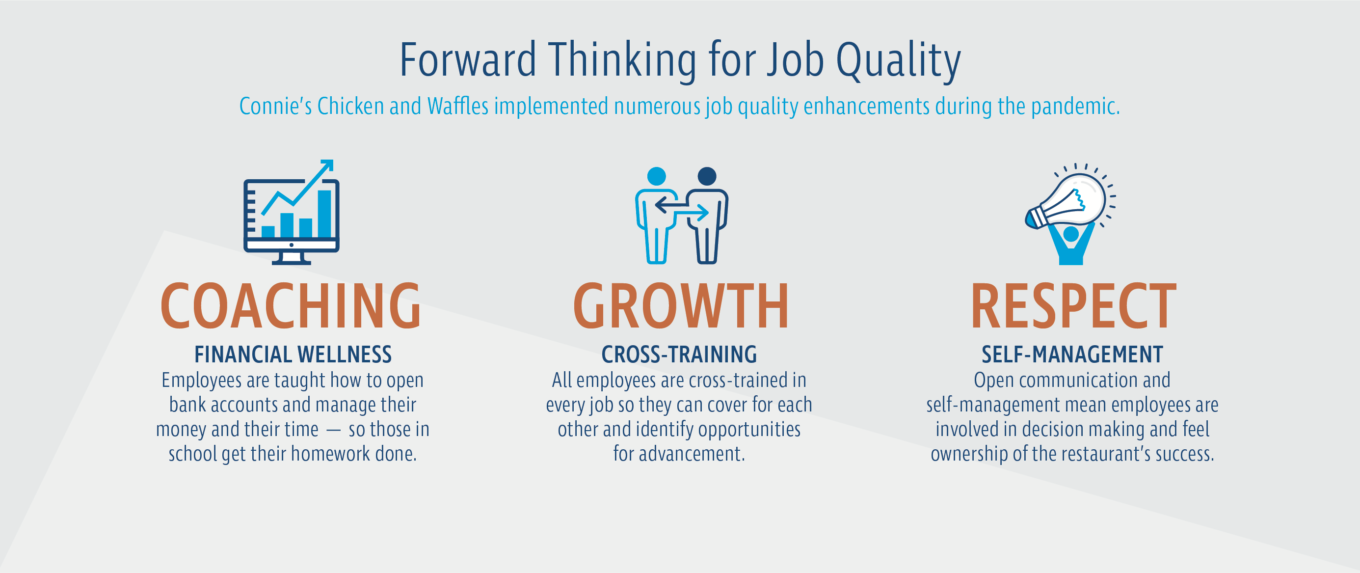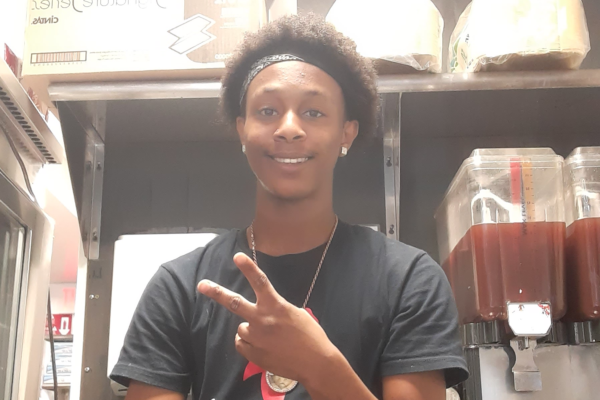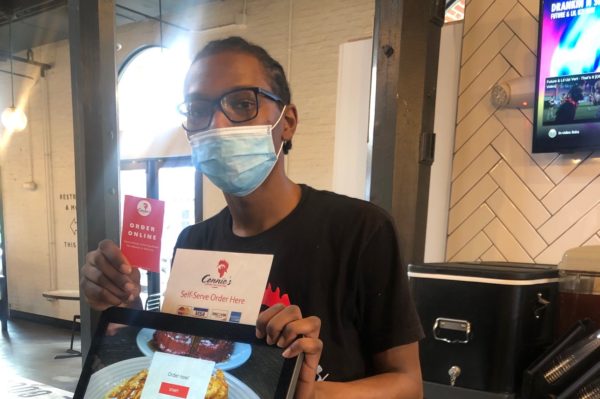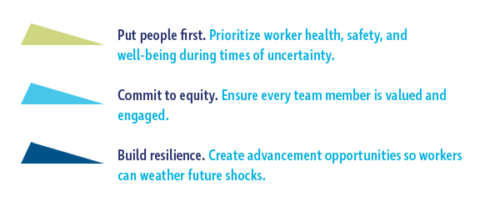Connie’s Chicken and Waffles
Where Everyone Leaves a Better Person
This profile is part of the Frontline Forward series. Frontline Forward recognizes employers whose good jobs practices have protected, supported, and developed frontline workers throughout the coronavirus pandemic. The key job quality practices and policies that are highlighted throughout the profile are drawn from the National Fund’s Job Design Framework. Designing quality jobs is good for workers, businesses, and their communities.
At Connie’s Chicken and Waffles, a family-owned and operated restaurant, the motto is: “Folks should leave better than when they came in.”
The team members who fry the chicken and pour the waffle batter understand that motto applies just as much to them as to the people who sit down to enjoy the food. Their bosses – co-owners and brothers, Shawn and Khari Parker – don’t just hire them to do a job, they act as mentors to the young people who help run their restaurants at locations in Baltimore, Maryland, and Wilmington, Delaware.
Developing people
This people-centered approach, an outgrowth of the brothers’ commitment to their community, also created a solid foundation that has helped them not only survive but thrive during a global pandemic and societal reckoning with racial inequities. While some restaurants were forced to close their doors for good, Connie’s was able to pursue plans for expansion. Its flagship location at Lexington Market is currently undergoing a multi-million dollar renovation and the company plans to soon add a pizza shop and juice bar to existing locations.

Rooted in the community
Connie’s draws its workers from the neighborhoods where it operates. The brothers, who grew up in Baltimore and believe they can improve their city by supporting its youth, create a holistic work environment where team members are shown how to thrive both inside and outside of work, where life can be challenging and resources lacking.
They offer financial counseling, helping team members open bank accounts and learn to manage their money. They teach them how to drive a car and how to invest in the stock market. They coach them on how to greet customers and speak to strangers. They make sure they’re doing their homework and getting good grades if they’re still in high school and help them apply for college or look for long-term opportunities if they’ve graduated.
For those on non-traditional paths, such as people formerly incarcerated, they offer second chances – without judgment. “Everyone makes mistakes,” said co-owner Shawn Parker, who believes in showing everyone respect. “To continue in this community and be part of this community and feel wanted, you need to have a job.”
Others come to Connie’s through youth job training programs, such as YouthWorks, JobCorps, or Bloomberg Philanthropies. All are treated as equals, cross-trained in every job so they can cover for each other as needed. They’re given encouragement for advancement and every opportunity to excel, both at work and outside the restaurant when their shift ends.
 |
– Tahkei Williams, Crew Member, Wilmington |
Extra supports when they need it
While Connie’s can’t provide traditional benefits packages to its team of mostly part-time workers, the brothers offer other types of support. In addition to shared tips, they give team members periodic performance bonuses and incentives. They feed them while they’re at work, provide transportation when needed, and support them in career and life goals that extend past their time at Connie’s.
“They talk to us all individually, one v. one,” said Tristan White, a 16-year-old from West Baltimore who’s been working at Connie’s since 2019. “Me at least, I know, every time my employer sees me, he asks me how things is at home, how’s school, what am I doing. That might not be the biggest thing, but that matters a lot. Kids, they might not really get that.”
If there’s a problem, the brothers are there to help. Can’t get to work on time? They’ll send an Uber. Need a more flexible schedule or additional shifts? The Parkers use three apps, one of which they created, to allow workers to swap shifts, complete tasks, and communicate quickly and easily.
“If you have a problem, they literally give you a solution,” said Tahkei Williams, 22, who picked up another job when Connie’s Wilmington location shut down during the pandemic, but returned as soon as the restaurant reopened. He came back, he said, because he loved working there so much. “They encourage me to never give up and keep going. Like if I really want something, they just tell me keep going. Don’t let nobody stop me.”
– Montrell Hamilton, Crew Member, Baltimore |
 |
Safety and respect create calm in uncertain times
At the high-traffic Fells Point location, which closed for only three days after COVID hit, team members were given the option of continuing to work through the pandemic or knowing they’d have a job waiting when they were ready. Safety came first. Those who kept working were given personal protective equipment and the opportunity to work double shifts to minimize transportation costs and exposure, and to allow more days at home. The restaurant shifted to curbside pickup and increased third-party deliveries to further reduce in-person contact.
“When it first hit, they provided us and even customers with black masks,” said D’Andre Shaw, a 22-year-old manager at the Broadway Market location, who started as a crew member during his mid-teens. He remembers how the brothers reached out to him when he called in sick because he thought he had contracted the virus. “They would send me messages checking on me, showing that they really cared.”
Team members say personal interaction with management is the norm. If they have concerns or ideas for how to make things run smoother, they know they’ll be heard. Having open communication and self-management helps everyone, Parker said. “Yes, we are the owners. We sign the leases and the checks. But we are all working on the same project. Everyone just has a different function.”
 |
– D’Andre Shaw, Manager at Broadway Market location |
Pride and ownership help the business succeed
“Our team members are encouraged to give us feedback on the supplies we order, for example. They are involved in a lot of decision-making.”
It helps team members take pride and ownership in the restaurant’s success. One team member, who began working part-time during college and quickly became a team leader, grabbed a pen and a cup and created a suggestion box for customers to leave feedback. Others leave positive notes for customers on top of the boxes of food they pick up or deliver. “We appreciate you. See you soon. Spread the love.”
Parker said that’s something he fully embraces. “Team members and customers – they are who drive this company.”
About Frontline Forward
With Frontline Forward, the National Fund for Workforce Solutions recognizes employers whose good jobs practices have protected, supported, and developed frontline workers throughout the pandemic and beyond. These businesses have made the workplace safer and provided compassion, support, and flexibility to families during this time of illness and uncertainty. They offer advancement opportunities, so workers are more resilient to future shocks. Most importantly, they’ve created a workplace culture that ensures every team member is valued and given the chance to take part in their own — as well as the company’s – success.
The Frontline Forward Principles

Frontline Forward is made possible through a generous investment from Walmart to engage service sector employers to improve the quality of their jobs.

